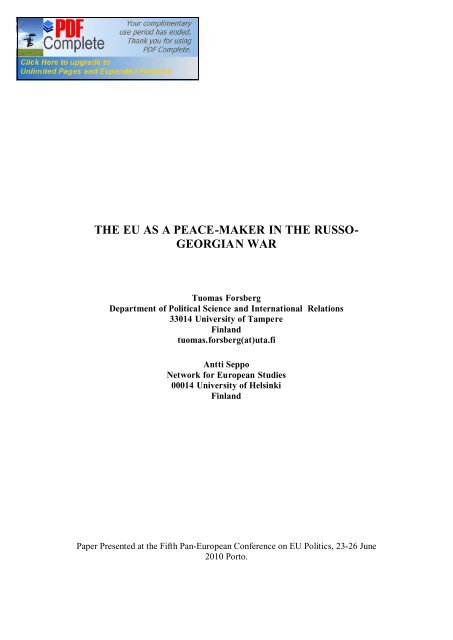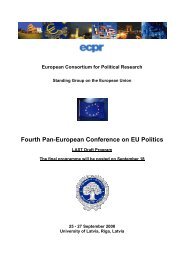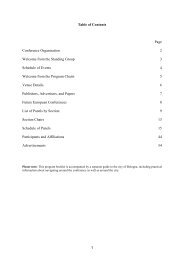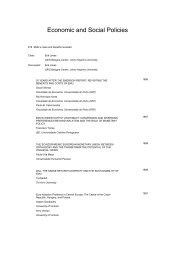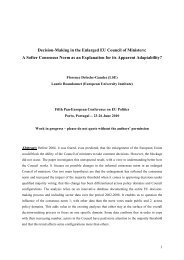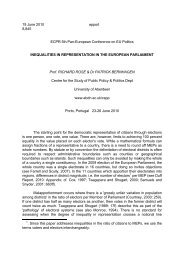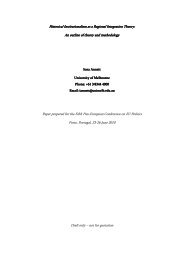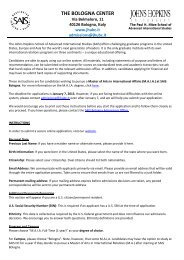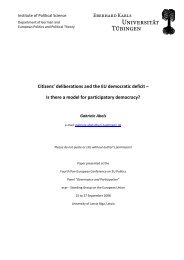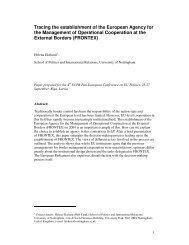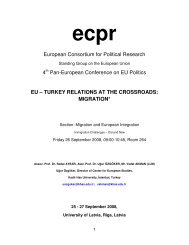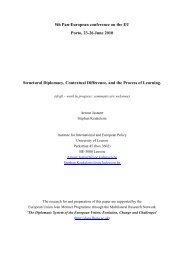THE EU AS A PEACE-MAKER IN THE RUSSO- GEORGIAN WAR
THE EU AS A PEACE-MAKER IN THE RUSSO- GEORGIAN WAR
THE EU AS A PEACE-MAKER IN THE RUSSO- GEORGIAN WAR
Create successful ePaper yourself
Turn your PDF publications into a flip-book with our unique Google optimized e-Paper software.
<strong>THE</strong> <strong>EU</strong> <strong>AS</strong> A <strong>PEACE</strong>-<strong>MAKER</strong> <strong>IN</strong> <strong>THE</strong> <strong>RUSSO</strong>-<br />
<strong>GEORGIAN</strong> <strong>WAR</strong><br />
Tuomas Forsberg<br />
Department of Political Science and International Relations<br />
33014 University of Tampere<br />
Finland<br />
tuomas.forsberg(at)uta.fi<br />
Antti Seppo<br />
Network for European Studies<br />
00014 University of Helsinki<br />
Finland<br />
Paper Presented at the Fifth Pan-European Conference on <strong>EU</strong> Politics, 23-26 June<br />
2010 Porto.
1<br />
Introduction<br />
I believe we can say with a straight face that the <strong>EU</strong> rose to the occasion. We<br />
have acted in unity, with determination and we have achieved clear results.<br />
Javier Solana (2008)<br />
When the <strong>EU</strong>, under the French Presidency, acted as a peace mediator during the<br />
Russo-Georgian war in August 2008, it was widely seen as a sign of the <strong>EU</strong>s<br />
growing role in issues of war and peace in world politics. The <strong>EU</strong> acted swiftly and in<br />
a seemingly united manner in a difficult situation and managed to broker a cease-fire<br />
between the conflicting parties. The <strong>EU</strong> also decided to establish a monitoring<br />
mission to Georgia and to launch an international fact-finding mission to investigate<br />
the origins and the course of the conflict. Together with the UN and the OSCE, the<br />
<strong>EU</strong> is also hosting the peace talks between Russia and Georgia in Geneva. Jean-Pierre<br />
Jouyet (2009: 88), the French Minister for European Affairs, argued that the Georgian<br />
crisis was as important for European diplomacy as Euro was for European economic<br />
politics. The <strong>EU</strong> Council report on the implementation of the European Security<br />
Strategy also highlighted the Georgian experience by declaring that Our Georgia<br />
mission has demonstrated what can be achieved when we act collectively with the<br />
necessary political will. (European Council, 2008)<br />
The achievements of the <strong>EU</strong>, in particular as far as the cease-fire was<br />
concerned, were often contrasted with the failure of the <strong>EU</strong> to deal with the Balkan<br />
crisis during the 1990s (Whitman and Wolff, 2010). Famously, the <strong>EU</strong> failed to act as<br />
a peace mediator in the Balkans during the 1990s. At that time the hour of Europe<br />
turned out to be an empty slogan. The cease-fire in the Bosnian war was achieved<br />
through NATO intervention and the peace through US-led negotiations at Dayton.<br />
Despite the fact that the <strong>EU</strong>s role in the Russo-Georgian war was seen as a<br />
success by Solana and many other <strong>EU</strong> representatives and commentators, there were<br />
sceptical interpretations too. First of all, the <strong>EU</strong> was not able to prevent the war.<br />
Second, the <strong>EU</strong> did not receive all the style points when mediating the cease-fire,<br />
since the conditions remained vague and not thoroughly implemented. Thirdly, so far<br />
the <strong>EU</strong> has not been able to bring the parties toward a more lasting peace. Fourthly,<br />
the role of the <strong>EU</strong> in the peace negotiations could not stand the test of the principles<br />
that the <strong>EU</strong> wanted to uphold. Finally, it was unclear to what extent the success could<br />
have been attributed to France rather than the <strong>EU</strong>.<br />
In this chapter we will try to do two things. First, we will critically evaluate<br />
the conflicting claims about the merits of the <strong>EU</strong>s mediation effort in the Russo-<br />
Georgian war. While realising that it is probably still too soon to present the whole<br />
story, we will construct an empirical narrative that helps to conceptualise the role of<br />
the <strong>EU</strong> with regard to the Russo-Georgian war and its peace negotiations. Second, and<br />
even more importantly, we will also try to take a closer look at the sources of the<br />
<strong>EU</strong>s influence in the crisis based on a theoretical sketch that combines a theory of<br />
mediation with theories of the nature of the <strong>EU</strong>s power. If the <strong>EU</strong> was not successful<br />
in mediating conflicts in the 1990s but was so in the 2000s, how can we explain the<br />
growing impact of the <strong>EU</strong>? On the basis of this analysis, we will draw some<br />
conclusions about the diplomatic role and influence of the <strong>EU</strong> towards third parties in<br />
particular with regard to international conflicts.<br />
The concept of success is, of course, very slippery and is difficult to pin<br />
down in policy analyses (Baldwin, 2000). However, it is imperative at some point to
2<br />
try to evaluate the impact of the <strong>EU</strong>s policies, in order to be able to make sense of the<br />
<strong>EU</strong> as an international actor. Jørgensen (1998) suggests that the yardstick of success<br />
can be external, internal or a combination of the two. External criteria mean that we<br />
have formed a baseline against which we measure success, whereas internal criteria<br />
mean that we take the stated goals and aims of the <strong>EU</strong> at face value for a yardstick of<br />
success. Jørgensen recommends a mixed approach, but how such a mix is best formed<br />
varies from case to case. Very seldom does a particular policy constitute full success<br />
or a complete failure. Moreover, to state that the <strong>EU</strong> was a successful mediator in the<br />
crisis is not the same as arriving at a conclusion that the <strong>EU</strong>s policies in respect to the<br />
Caucasus and Georgia have been successful on the whole. What is more, the <strong>EU</strong>s<br />
policy towards the Caucasus is, in any case, just beginning to take some shape,<br />
particularly in the form of the new Eastern Partnership Initiative of the <strong>EU</strong>. These<br />
remarks notwithstanding, we believe that by analysing the <strong>EU</strong>s policies and its<br />
impact in such a narrow area of policy as mediation, we are able to draw attention to<br />
some important aspects affecting the <strong>EU</strong>s policymaking capabilities and its influence<br />
on policy outcomes.<br />
Mediation Theory and the Role of the <strong>EU</strong><br />
There are two principal types of successful mediation and three basic views of the<br />
sources and nature of the power of the <strong>EU</strong> in international affairs. In order to sketch a<br />
theory of <strong>EU</strong> mediation in general and its role in the Russo-Georgian war in<br />
particular, we combine these two typological theories into one. We will distinguish<br />
between the possible roles of the <strong>EU</strong> as an interested party playing a power political<br />
role, an interested normative power, and a neutral facilitator that is interested in<br />
achieving peace but not primarily in maximising national interests of the <strong>EU</strong> member<br />
states or promoting certain predetermined values.<br />
Perhaps the best-known theory of conflict mediation in international affairs<br />
derives from Princen (1992). He distinguishes between two roles for mediators. First<br />
there is the neutral mediator, who acts as a facilitator in the conflict resolution. The<br />
primary role of the facilitator is to act as a messenger, recognise the shared interests<br />
and the bargaining space. In essence, the solution reflects the common interests of the<br />
conflicting parties, and the mediator does not change or affect these interests through<br />
its own action. She simply provides the channel for negotiations and thereby helps to<br />
remove possible psychological barriers of a peace deal, as it is easier to start<br />
negotiations through contacting a third party rather than the opponent directly. The<br />
other role for a mediator is power political. The mediator is an interested party, and<br />
shapes the achieved resolution to the conflict through using her own power resources.<br />
By promises and threats she can affect the interest structure of the conflicting parties.<br />
The outcome therefore reflects as much the interests of the mediator as those of the<br />
conflict parties. Other, newer studies of mediation (Bercovitch and Gartner 2009) may<br />
suggest a third type of a mediator between the two, based on prominence of<br />
procedural strategies, but the principal dichotomy between facilitative and power<br />
political mediators remains the same.<br />
When looking at the literature on the <strong>EU</strong> as an international actor, we can<br />
discern three different alternatives. First, there is the view that the <strong>EU</strong> is or at least is<br />
developing into a traditional self-interested great power with military resources.<br />
Secondly, there is the idea of the <strong>EU</strong> as a trade power, whose primary interests and<br />
vehicle of power in international affairs is its economic might. Thirdly, there is the<br />
idea of the <strong>EU</strong> as a normative power, whose power rests on persuasion and ability to
3<br />
shape discourses (Manners, 2002). The primary interest of the <strong>EU</strong> as a normative<br />
power is to promote universal norms, such as human rights norms.<br />
If these two typological theories are combined, we can arrive at three possible<br />
roles of the <strong>EU</strong> as a mediator and, therefore, also at three different possible<br />
explanations of the success of the <strong>EU</strong> as a mediator in the Russo-Georgian war. First,<br />
the <strong>EU</strong> can be seen as a facilitator who was successful in mediating the cease-fire to<br />
the war because of its perceived impartiality and neutrality. Second, the <strong>EU</strong> can be<br />
seen as an interested party who was successful because it used its economic and to a<br />
lesser extent its military resources in mediating the conflict. We put the military<br />
power and economic power dimensions here together, because from the outset it is<br />
rather clear that, if the military power of the <strong>EU</strong> had any significance, it was rather<br />
limited. Thirdly, the <strong>EU</strong> can be seen as a normative power that was successful in the<br />
mediation because of its ability to shape the normative understandings of the<br />
conflicting parties or at least to get them to accept a normatively motivated solution<br />
(Parmentier, 2009).<br />
Obviously, the effectiveness of different mediation strategies depends on the<br />
context. Nevertheless, Bercovitch and Gartner (2009) argue that, on the basis of<br />
empirical conflict statistics, it seems that power political strategies work best in highintensity<br />
disputes, whereas a pure facilitative strategy performs least well. In<br />
asymmetric conflicts the role of the mediator is important if it can convince the<br />
stronger party to abstain from further escalation of the conflict and at the same time<br />
the weaker party understands that it has to compromise to a greater degree later if it<br />
does not agree to the settlement now. We realise that our sketch as well as the<br />
typological theories upon which the sketch is based is rather rudimentary. It is seldom<br />
if ever possible to discern pure types. The roles can nevertheless be seen as idealtypes<br />
that make it possible to consider the weigh and role of different explanations.<br />
The Russo-Georgian War<br />
As is always the case with armed conflicts and other disputes, there is no objective<br />
account of the events of the Russo-Georgian war of 2008. A number of reliable<br />
scholarly works on the course of the conflict exist, however (Chronology 2008,<br />
Oksanenko 2008, Fischer 2008, Allison 2008, Cheterian 2009 and Asmus 2009).<br />
What we know for a fact, at the moment, is that the Georgian military launched a<br />
military operation over the border of the breakaway territory of South Ossetia at the<br />
eve of the opening ceremony of the Olympic Games in Beijing on 7 August. The<br />
Georgian offensive devastated the South Ossetian capital of Tskhinvali, where a<br />
number of Russian peace-keepers and hundreds of civilians were killed or wounded in<br />
the attacks.<br />
Russia responded with military force immediately the next day, 8 August. It<br />
launched its offensive through the Raki tunnel from North Ossetia, dispelled the<br />
Georgian troops from South Ossetia and advanced over the South Ossetian border<br />
towards the Georgian capital of Tbilisi. Russian forces bombed and then occupied the<br />
Georgian city of Gori and, having opened a second front from Abkhazia, they took<br />
control of the port town of Poti. On 10 August Georgian troops were given the order<br />
to retreat from South Ossetia. The Russians stopped their invasion around Gori, 60<br />
kilometres from Tbilisi, and announced that they did not intend to advance on Tbilisi.<br />
Meanwhile in South Ossetia, paramilitary units harassed the Georgian minority<br />
population which fled to areas controlled by the Georgian government.<br />
The UN Security Council met right after the outbreak of hostilities. In the<br />
meeting on 9 August both the Georgian and Russian envoys accused one another of
starting a war that could have grave consequences and would endanger the peace in<br />
the whole of Caucasus. On 10 August the UNSC convened for the third time to react<br />
to the ever-escalating crisis, but no solution was found due to Russias resistance to a<br />
joint UNSC resolution.<br />
The <strong>EU</strong> reacted to the crisis under the <strong>EU</strong> presidency of France. Foreign<br />
Minister Bernard Kouchner flew to Tbilisi together with the OSCE chairman,<br />
Finlands Foreign Minister Alexander Stubb, on late 9 August. On the way and the<br />
following morning they drafted a tentative ceasefire proposal on three key issues:<br />
cessation of hostilities, recognition of Georgias territorial integrity, as well as rapid<br />
re-establishment of the status quo ante. They discussed the plan with Foreign Minister<br />
Ekaterine Tkeshelashvili. Then they presented the proposal to President Mikhail<br />
Saakashvili who accepted it. After having visited the town of Gori on the request of<br />
the hosts, Kouchner and Stubb flew to Moscow in order to negotiate a ceasefire with<br />
the Russians. However, the French President Nicholas Sarkozy decided also to come<br />
to Moscow to negotiate the ceasefire personally. He explained to Kouchner that he did<br />
not want his hands be tied by a paper negotiated in Tbilisi without his input and with<br />
someone the Russians hated. He brought with him a new peace plan that was based on<br />
the Kouchner-Stubb proposal but was prepared in Paris. (Asmus 2010, 195-6).<br />
Sarkozy presented his plan to President Dmitri Medvedev on 12 August. The<br />
six principles of the peace plan were finally drafted by Sarkozy and Medvedev<br />
together on basis of the French proposal. They included, first, the non-use of force;<br />
second, cessation of hostilities; third, free access to humanitarian aid; fourth,<br />
withdrawal of Georgian forces to their normal bases; and, fifth, withdrawal of Russian<br />
military to the lines prior to the start of hostilities. The fifth clause included the much<br />
disputed Russian claim for additional security measures pending international<br />
mechanisms. The final clause called for international discussions on achieving lasting<br />
security in Abkhazia and South Ossetia. The reference to respecting the territorial<br />
integrity of Georgia was left out in the final peace plan, because the French team saw<br />
stopping the war as a priority. Medvedev accepted the plan during the same day with<br />
obvious backing from Prime Minister Vladimir Putin who also participated in the<br />
negotiations.<br />
On 13 August Saakashvili secured Georgias agreement to the peace plan of<br />
President Sarkozy. Saakashvili was not quite happy with the plan, and he requested in<br />
particular the removal of the sixth clause referring to talks on the future status of<br />
South Ossetia and Abkhazia, and President Medvedev agreed to this. Saakashvili<br />
signed the modified agreement on 15 August during the visit of US Foreign Secretary<br />
Condoleezza Rice. Rice saw her role as convincing the Georgians to agree to a<br />
ceasefire that was flawed but necessary, but it had to be done in terms that were not<br />
demeaning to the Georgians (Asmus 2010, 209). Medvedev accepted the document on<br />
16 August, but Russia did not start troop withdrawals immediately. These steps<br />
towards peace got the unanimous support of all <strong>EU</strong> member states.<br />
A key session of the UNSC was held on 19 August. The Russian ambassador<br />
rejected the draft resolution presented by France because it insisted on respecting<br />
Georgias territorial integrity and its internationally acknowledged borders. The<br />
Russian ambassador claimed that the French draft separated individual elements of<br />
the six-point Moscow Peace Plan and reinterpreted them for propaganda purposes.<br />
(UN Security Council, 2008). As Russia was accused of failing to honor the ceasefire<br />
plan, it circulated its own UN Security Council Resolution. It reiterated Moscows<br />
view that the peace plan allowed Russia to implement additional security measures<br />
before leaving Georgia.<br />
4
The French <strong>EU</strong> Presidency strictly condemned Russias de facto recognition<br />
of the independence of Abkhazia and South Ossetia on 26 August. In the view of the<br />
<strong>EU</strong>, Russia had neither respected the agreed six-point agreement nor had it began to<br />
withdraw its troops in a timely manner. Some member states called for immediate<br />
countermeasures. The <strong>EU</strong> convened an emergency summit on 1 September in<br />
Avignon. At the meeting, the <strong>EU</strong> member states decided to freeze the negotiations on<br />
a new cooperation agreement with Russia. There was however no agreement on<br />
imposing additional sanctions on Russia. The <strong>EU</strong> was also not willing to send armed<br />
<strong>EU</strong> peacekeepers to Georgia. Instead, the possibility of establishing an autonomous<br />
civilian monitoring mission in Georgia was discussed. The <strong>EU</strong> summit decisions were<br />
seen as favourable by Russia. Russian Prime Minister Putin commented on the <strong>EU</strong>s<br />
summit by saying that Thank God, common sense prevailed. We do not see any<br />
extreme conclusions or proposals, and this is very good. We have a foundation to<br />
continue dialogue with our European partners (RIA Novosti, 2008).<br />
Following talks between Sarkozy, <strong>EU</strong> High Representative Solana and the <strong>EU</strong><br />
Commission Head José Manuel Barroso and Russian representatives, Russia agreed<br />
on 8 September to withdraw its troops from Georgian territory surrounding South-<br />
Ossetia and Abkhazia. The rest of the pull-out was supposed to happen once an<br />
international monitoring mission was deployed. The Council of the European Union<br />
acted swiftly. It decided on 15 September to establish an autonomous civilian<br />
monitoring mission (<strong>EU</strong>MM) of 200 European monitors in Georgia that was deployed<br />
on 1 October. Despite Georgian wishes and because of the Russian resistance, the<br />
mission did not include any US observers. The <strong>EU</strong> Council also nominated a Special<br />
Representative for the Crisis in Georgia, Pierre Morel, in addition to already existing<br />
Special Representative to South Caucasus, Peter Semneby. Russia respected the 8<br />
September agreement and pulled out its military step by step. On 8 October the<br />
<strong>EU</strong>MM could witness that Russia seems to have completed most of withdrawal (The<br />
European Union Monitoring Mission, 2008).<br />
The relations between the <strong>EU</strong> and Russia were normalized at the <strong>EU</strong>-Russia<br />
Summit held on 14 November in Nice. The <strong>EU</strong> saw no further reason to freeze the<br />
start of the negotiations for the new strategic partnership agreement, since Russia had<br />
for the most part respected its bid to withdraw its forces from Georgia. Russia had,<br />
however, not withdrawn its recognition of the breakaway republics and it still<br />
maintained a small troop presence in Georgia and this is why Lithuania criticised the<br />
decision of normalizing relations. Otherwise the summit did not produce any major<br />
successes, but both sides described the atmosphere of the negotiations as positive.<br />
Instead of Georgia, the main focus of the meeting dealt with the global financial crisis<br />
and its effects both in the <strong>EU</strong> and Russia. The <strong>EU</strong> reiterated that it was willing to<br />
support Russias membership in the WTO.<br />
In December 2008 the <strong>EU</strong> decided to set up an independent international fact<br />
finding mission that would probe into the causes and course of the Georgian conflict.<br />
Already during the Avignon meeting in September a group of countries, supported by<br />
the French presidency, were calling for such an investigating body. The commission<br />
head was Swiss diplomat and a former UN special envoy to Georgia Heidi Tagliavini<br />
and the group consisted of legal and military experts from <strong>EU</strong> countries.<br />
The <strong>EU</strong>MM was the most important tool of the <strong>EU</strong> conflict management in<br />
the field. It could not prevent small incidents but overall stabilization and<br />
normalization was on increase. However, the <strong>EU</strong>MM was not able to utilize fully its<br />
mandate, as Russia was not willing to grant access to the <strong>EU</strong> monitors to South<br />
Ossetia and Abkhazia. The South Ossetians and Abkhazians as well as Russia<br />
5
6<br />
opposed the <strong>EU</strong> presence on their territories since the <strong>EU</strong> mandate according to<br />
their interpretation covered only Georgias territory.<br />
In summer 2009, the <strong>EU</strong>MM remained the only international observer group<br />
in Georgia and its breakaway republics. The mandate of the OSCE Mission to<br />
Georgia, which had operated in Georgia for over 15 years, was not extended at the<br />
end of 2008 due to Russias opposition. UNOMIG, which had been in Georgia from<br />
1993, came also to an end in June 2009. In both cases, the <strong>EU</strong> invested a lot of<br />
diplomatic energy in its effort to get Russias approval on extension of the mandates,<br />
but the <strong>EU</strong> was ultimately unable to move Russia in the issue.<br />
At this writing (spring 2010) the peace negotiations in Geneva have not<br />
produced any major breakthrough. During the years course of negotiations, actually<br />
only little progress can be witnessed. Positive results have been achieved with regard<br />
to the returning of internally displaced persons and providing for their security by<br />
incident prevention mechanisms and continuous cooperation between the secessionist<br />
and Georgian authorities (Co-Chairs of the Geneva Discussions, 2009). Moreover, the<br />
fact that the war has not recurred, contrary to much speculation during the summer of<br />
2009, speaks on behalf of a kind of success of the negotiations.<br />
The <strong>EU</strong>s Role as a Mediator<br />
The <strong>EU</strong> has security, economic and normative interests in the Caucasus region. With<br />
regard to security, general stability was the key goal. The recognition of the South<br />
Caucasus as a possible problem area for the Union was acknowledged as part of the<br />
<strong>EU</strong> security strategy already in 2003. According to the strategy, we should now take<br />
a stronger and more active interest in the problems of the Southern Caucasus, which<br />
will in due course also be a neighbouring region (European Council 2003). Since<br />
2003, the European Council also had a decided to establish the Special Envoy in the<br />
South Caucasus. The <strong>EU</strong> had tried to help in resolving the frozen conflicts of<br />
Abkhazia and South Ossetia. As late as in June 2008, Solana had travelled to Georgia<br />
in order to strengthen the role of the <strong>EU</strong> in the mediation efforts. The <strong>EU</strong>s economic<br />
interests in the Caucasus region concentrate on the diversification of the <strong>EU</strong>s energy<br />
supplies. Gogolashvili (2009, p. 102) has suggested that the <strong>EU</strong>s need to export<br />
energy ultimately led the <strong>EU</strong> to include the Caucasus states in the European<br />
Neighbourhood Policy (ENP). European pipeline projects are already underway in<br />
the region (Nabucco, Baku-Ceyhan etc.). Finally, the <strong>EU</strong> has also a set of normative<br />
interests in the region that concern mostly democracy and human rights promotion. In<br />
particular, Georgias Rose Revolution in 2003 was seen as a demonstration of the<br />
expansion of European values and normative ideas. The <strong>EU</strong> had also sponsored a rule<br />
of law mission (<strong>THE</strong>MIS) as well as a border support mission (<strong>EU</strong>SR BST) in<br />
Georgia.<br />
When the open war between Georgia and Russia started in August 2008, the<br />
<strong>EU</strong> was thus already present in the region in a number of ways. In the eyes of the<br />
conflict parties the <strong>EU</strong> enjoyed a reasonable degree of impartiality at least when<br />
compared to other possible actors, such as the US, NATO, the UN or OSCE. The<br />
Georgians viewed the <strong>EU</strong> positively, although not all recommendations stemming<br />
from Brussels of the <strong>EU</strong> were seen as necessary (Gogolashvili 2009). As to the<br />
security questions, the <strong>EU</strong> and the Europeans were seen as too soft. For example,<br />
Georgians did not quite trust the Germans in their attempts to mediate in the frozen<br />
conflicts and thought that they were too naïve about Russian interests (Asmus, 2010,<br />
p. 156). Russia, in turn, was extremely sensitive towards the US and NATO presence
in Georgia. Russia was also sceptical about the UN and OSCE and did not prolong the<br />
mandates of the observing missions of these organizations in Georgia. By contrast, it<br />
allowed the <strong>EU</strong>MM to operate in the country. As Russian foreign minister Sergei<br />
Lavrov (2008) commented, we are glad that the settlement of the Caucasus crisis has<br />
provided a serious subject for our cooperation with the European Union in regional<br />
affairs. Lavrov considered it good that a European solution to the problem was<br />
found.<br />
During the crisis and the subsequent negotiations, the <strong>EU</strong> introduced an array<br />
of actions that reflected the model of an impartial mediator. It refrained from putting<br />
blame to either of the party for the outbreak of the war. The ceasefire was achieved<br />
because it was in the interests of both parties as the Russians said, they had achieved<br />
their objectives and did not want to continue the invasion to Tbilisi and not because<br />
the <strong>EU</strong> had somehow changed or influenced the interest structure or the normative<br />
ideas of the parties. The principles that the <strong>EU</strong> drafted demanded the return to the<br />
status ex quo ante. The <strong>EU</strong>MM was there to observe and build confidence and not to<br />
enforce a peace agenda onto the parties. During the Geneva negotiations, the <strong>EU</strong><br />
supported the establishment of the incident prevention and response mechanisms that<br />
would permit weekly meetings and even more often if necessary, between<br />
international security monitors and local security officials in the areas of tension.<br />
Moreover, a special hotline was created, and the parties agreed on regular joint visits<br />
to be conducted in the areas to defuse tensions.<br />
A good example of action based on impartiality was also the <strong>EU</strong> sponsored<br />
fact finding mission. The report that was published in October 2009 examined and<br />
discussed the roots and causes for the outbreak of the conflict. The fact that the<br />
mission head was a Swiss diplomat underlined the image of impartiality. The mission<br />
was respected as being neutral by the Russians and the Georgian opposition but not<br />
that much by the Georgian government. The key message of the report was that the<br />
Georgian side initiated the conflict but that Russia was not an innocent victim.<br />
(Independent International Fact-Finding Mission, 2009). Indeed, impartial actions<br />
were of course not always neutral as to the effects. As for the fact finding mission, it<br />
became increasingly clear that it was Georgia which actually started the hostilities by<br />
bombarding Tskhinvali. This uncomfortable fact that is still denied by the Georgian<br />
government may have contributed to the deterioration of the atmosphere at the<br />
Geneva negotiations in the form of new accusations. The <strong>EU</strong>MM can actually have<br />
unintended effects in helping Russia to fortify its claim on the independence of South<br />
Ossetia because it has not been able to monitor in South Ossetia and unable to enforce<br />
the parties to peace. Moreover, the effective implementation of the mechanisms<br />
introduced in the Geneva negotiations remains an open question as it is, eventually,<br />
tied to the good will of the conflict parties.<br />
The <strong>EU</strong> acted as an interested power political party in the conflict only to a<br />
very limited extent. It tried to influence Russia through freezing the negotiations on<br />
the post-PCA settlement but everybody knew that it was only a symbolic act and not a<br />
real pressure that would bring any results. The <strong>EU</strong> did not want to introduce economic<br />
sanctions or other heavier sticks in order to force Russia to withdraw its troops<br />
quicker or to back track its recognition of the independence of Abkhazia and South<br />
Ossetia. The fact that the <strong>EU</strong> did not resort to any hard power measures was of<br />
course welcomed by the Russians. Neither did the <strong>EU</strong> use its economic leverage to<br />
influence Georgia or the breakaway republics. It granted an aid package that<br />
amounted up to 500 million, but this aid was unconditional with no political strings.<br />
The <strong>EU</strong> aimed at rebuilding confidence in the Georgian economy, boosting<br />
7
8<br />
investment in critical infrastructure including energy and providing shelter, food, and<br />
other basic services to the internally displaced. (Ferrero-Waldner, 2008).<br />
The <strong>EU</strong>s normative influence was most visible in its demand for protecting<br />
the rights of the internally displaced and especially women and children. The<br />
normative aim of promoting Georgians territorial integrity has been high on the<br />
agenda, but so far the Russians have been unwilling to buy into that norm. The <strong>EU</strong><br />
itself persuaded the Georgians to accept the presence of Abkhazian and South<br />
Ossetian delegations in the peace talks, which would suggest that the <strong>EU</strong> used its<br />
normative power against its normative goals. Its normative power failed in many<br />
cases when dealing with Russia, most notably in preventing the recognition of the<br />
breakaway republics and getting the Russian approval to the extension of the OSCE<br />
and the UN monitoring missions.<br />
Conclusions<br />
This is not the first attempt to assess the role of the <strong>EU</strong> in the context of the Russo-<br />
Georgian war of 2008. One authoritative assessment by the House of Lords arrives in<br />
its report at the following conclusion:<br />
The <strong>EU</strong>s response to the conflict in Georgia was rapid and<br />
reasonably successful. It persuaded the two parties to accept a<br />
ceasefire, and with some delay brought about the withdrawal of<br />
Russian troops from all Georgian territory outside South Ossetia and<br />
Abkhazia and brought the parties together for talks in Geneva. This<br />
success owed much to the effectiveness of a strong Presidency with<br />
whom the Russians were prepared to negotiate. The <strong>EU</strong> was the<br />
obvious and perhaps only credible body to act as intermediary in the<br />
conflict, and acted with unaccustomed confidence and authority.<br />
(Government Response to the House of Lords European Committee,<br />
2009)<br />
On the basis of our study we principally agree with this conclusion. However, we<br />
would like to add a few qualifications and discuss the explanations of success through<br />
the three different mediator roles that we sketch for the <strong>EU</strong>.<br />
The role of France in mediating the conflict was prominent to the extent that<br />
many observers have talked more about the French than the <strong>EU</strong> role in the conflict<br />
since Solana and the <strong>EU</strong> institutions were rather absent in the acute phase of the crisis.<br />
Frances leadership was important because it was a great power, but also because it<br />
was seen as being more impartial than many other <strong>EU</strong> member states: France, for<br />
example, had not supported the admission of Georgia into the Membership Action<br />
Plan programme at the Bucharest NATO summit in April 2008. As one Newsweek<br />
article (McNicoll 2008) put it: Frances historic experience with great power politics<br />
and its extensive, well-oiled diplomatic machine undoubtedly lent Sarkozy that extra<br />
degree of credibility when negotiating with Moscow. Still the question is whether a<br />
smaller but equally impartial and active chair would also have been able to act as a<br />
broker if it had enjoyed a similar status of impartiality. Too easily the conclusion is<br />
taken that, because France acted successfully as a broker, nobody else could have<br />
acted successfully as a broker. For example in 1999 it was the President of Finland,<br />
Martti Ahtisaari who was brokering the peace to the Kosovo War on behalf of the <strong>EU</strong>.<br />
Moreover, the more relevant question, at least after the entry of the Lisbon treaty into
force is, whether the <strong>EU</strong> foreign minister could play a similar role. What seems clear,<br />
however, was that Sarkozy enjoyed respect from the Russian side and during the<br />
September meeting he was able to use effectively the threat of walking out of the<br />
negotiations, had the Russians not adhered to the previous agreements.<br />
The <strong>EU</strong> and France were able to take the role of the mediator because both the<br />
US and the OSCE wanted the <strong>EU</strong> to play that role. The US, of course, had more<br />
military and diplomatic leverage than the <strong>EU</strong> and the OSCE was already present in<br />
the field, but both the US and the OSCE preferred to support the <strong>EU</strong> in the conflict.<br />
The conflict settlement would have been more difficult, or at least more complicated,<br />
if there had been institutional competition in this regard. The Georgian government<br />
obviously would have preferred NATO or the US over the <strong>EU</strong>, but did not have much<br />
choice. Anyway, they saw the <strong>EU</strong> as a better actor than the OSCE or the UN that were<br />
considered weak because of Russias involvement in the organisations. Most<br />
importantly, however, Russia preferred the <strong>EU</strong> over NATO or the US that Moscow<br />
was accusing of orchestrating the conflict. For Russia, it was a moral victory that the<br />
US was left out of the process. The OSCE was given some attention but Russia had<br />
become generally critical towards it and the <strong>EU</strong> led by France fitted Russian interests<br />
better.<br />
As far as our theoretical sketch about three different mediator roles is<br />
concerned, the success of the <strong>EU</strong> in mediating between Russia and Georgia was most<br />
visible concerning its role as an impartial facilitator. This is so because the <strong>EU</strong>s<br />
actions did not force the conflicting parties to any actions against their direct interests,<br />
but rather tried to overcome the psychological barriers and come up with at least the<br />
smallest common denominator determined by the <strong>EU</strong> in a pragmatic way (such as the<br />
benefit of the non-use of force). Moreover, also the implementation of the agreements<br />
was based on the good will of the parties.<br />
If we consider the success of the <strong>EU</strong> as a principal mediator that advances its<br />
interests through using its economic or military leverage, we can detect a very<br />
minimalistic role. For example, the ability to send a civilian monitoring mission was<br />
hardly dependent on the progress within the ESDP. The <strong>EU</strong> refrained from economic<br />
sanctions and used its economic aid in a structural or transformative rather than in<br />
a direct manner. These measures did not have any tangible impact on the core issue of<br />
the conflict related to political identity. Therefore it can be said that the <strong>EU</strong> lacked a<br />
comprehensive conflict management strategy (Whitman and Wolff, 2010).<br />
Finally, the <strong>EU</strong>s role as a mediator did not rely much on its normative power.<br />
A normative role was visible perhaps in the emphasis on protecting the civilian<br />
population but the <strong>EU</strong> also had to accept principles that contradicted its<br />
understandings of norms. Yet, with regard to the norm of territorial integrity that has<br />
been very high in the <strong>EU</strong>s priorities, the <strong>EU</strong> has been successful only in so far as it<br />
has been able to prevent a wider international recognition of the independence of the<br />
breakaway republics but even there, a more decisive role was probably played by<br />
China, which refused to recognise the republics. Yet, for the sake of pragmatism and<br />
stability, the <strong>EU</strong> has had to accept the de facto independence of Abkhazia and South<br />
Ossetia as well as to persuade Georgia to accept Abkhazia and South Ossetia to the<br />
negotiation table in Geneva. Moreover, the <strong>EU</strong>MM was not granted access to the<br />
secessionist regions, which can also be counted as a failure of the <strong>EU</strong> to achieve its<br />
normative objectives. There is, indeed, a certain contradiction in the <strong>EU</strong>s roles, as it<br />
has simultaneously tried to be both a neutral facilitator and a normative power.<br />
Precisely because the <strong>EU</strong> has some fundamental ideas and beliefs about key concepts<br />
such as state sovereignty and the interpretation of the international law, it is hard for<br />
9
the <strong>EU</strong> to keep up both with its impartiality and normative objectives if the aims<br />
collide in the eyes of the conflict parties, as happened in the aftermath of the crisis.<br />
Yet is up to the <strong>EU</strong> to come up with a strategy where both of these objectives can be<br />
sustained.<br />
Such a strategy would require, first, a solution to the <strong>EU</strong>s<br />
impartiality/normative power paradox as it now pits the <strong>EU</strong> acting against its own<br />
principles. Second, the <strong>EU</strong>MM is doing a good job on the ground by trying to get the<br />
parties to the conflict to abide by common rules and norms under <strong>EU</strong> supervision. Yet<br />
a more profound strategy should contain realistic, acceptable and implementable ideas<br />
on how to affect the secessionist regions in their pursuit of independence. One of the<br />
biggest problems relates to the fact that the <strong>EU</strong>, as an international actor, is<br />
irrevocably involved in the Caucasus without effectively being able to tackle the<br />
regional aspect of the crisis, precisely because it has not, up to date, been able to<br />
pursue its dual role without causing serious internal political contradictions. This is so<br />
because the <strong>EU</strong> has to cooperate with both Russia and other Caucasus states<br />
simultaneously: pleasing one is likely to alienate the other. Finding a balance is<br />
extremely difficult. In the long term, however, some kind of equilibrium on a general<br />
level is more likely than not to materialize, as the <strong>EU</strong>s track record with Russia has<br />
proven that energy policies, for instance, usually weigh more than human rights if the<br />
<strong>EU</strong> has to make a choice. But it is much harder for the <strong>EU</strong> as a mediator to find a winwin<br />
situation in the current crisis with which the <strong>EU</strong> could also live.<br />
The <strong>EU</strong> has not been able to come up with credible sticks nor effective carrots<br />
in its relations with Russia since the introduction of the concept of political<br />
conditionality in the framework of <strong>EU</strong>-Russia PCA agreement (Kratochvil, 2008;<br />
Haukkala, 2010). This is probably one reason why some observers are rather skeptic<br />
in their assessment of the <strong>EU</strong>s efforts as far as the Caucasus crisis in the long run is<br />
concerned (see e.g. Tocci, 2008; Merlingen and Ostrauskaite, 2009, Whitman and<br />
Wolff, 2010). The academic discussion of the <strong>EU</strong> as a normative power and the<br />
<strong>EU</strong>s self-understanding as a force for good aims at combining normative<br />
standpoints, not impartiality, with effectiveness in international crises (Manners,<br />
2002; Parmentier, 2009). Yet in the eyes of the conflict parties, the normativity of the<br />
<strong>EU</strong> may undermine its perceived impartiality. As a mediator the <strong>EU</strong> has a hard time<br />
living up to its promises, be they of normative nature or not. Therefore it seems that<br />
the linchpin of the <strong>EU</strong>s success as a mediator in future crisis in the eastern<br />
neighbourhood is not necessarily the introduction of powerful sticks or strong<br />
normative standpoints as they would most likely undermine the <strong>EU</strong>s role as an<br />
impartial facilitator. From the Russian point of view, a sufficiently independent but<br />
not a threatening posture proved to be a key factor that made it possible in the first<br />
place for the <strong>EU</strong> to assume the role as a mediator in the Georgian case.<br />
10
References<br />
Allison, Roy (2008). Russia Resurgent? Moscows Campaign to Coerce Georgia to<br />
Peace, International Affairs, vol. 84, no. 6, pp. 1145-1171.<br />
Antonenko, Oksana (2008). A War with No Winners, Survival, vol. 50, no 5, pp. 24-<br />
36.<br />
Asmus, Ronald D. (2010). A Little War That Shook the World: Georgia, Russia and<br />
the Future of the West. Houndmills: Palgrave Macmillan.<br />
Baldwin, David (2000). Success and Failure in Foreign Policy, Annual Review of<br />
Political Science, 2000, vol. 3, pp. 167-82.<br />
Bercovitch, Jacob and Scott Sigmund Gartner (2009). International Conflict<br />
Mediation: New Approaches and Findings. Abdington: Routledge.<br />
Cheterian, Vicken (2009). The August 2008 War in Georgia: from Ethnic Conflict to<br />
Border Wars, Central Asian Survey, vol. 28, no. 2, pp. 155-170.<br />
Chronology (2008). A chronology of the crisis, Strategic Comments, 14:7, 1-2.<br />
Co-Chairs of the Geneva Discussions (2009). Press Communique, 19 May<br />
http://www.consilium.europa.eu<br />
The European Union Monitoring Mission (2008) <strong>EU</strong>MM Witnesses the Withdrawal<br />
of Russian Troops, <strong>EU</strong>MM Press Release, 8 October. http://www.eumm.eu<br />
European Council (2008) Report on the Implementation of the European Security<br />
Strategy. Providing Security in a Changing World, Brussels, 11 December.<br />
European Council (2003) A Secure Europe in a Better World. European Security<br />
Strategy, Brussels 12 December.<br />
Ferrero-Waldner, Benita. (2008) Donors conference for Georgia: time to walk or<br />
talk, Speech/08/549, Brussels, 22 October.<br />
Fischer, Sabine (2008). Russia-Georgia Conflict in South Ossetia: Context and<br />
Implications for U.S. Interests, Caucasus Analytical Digest 01/08.<br />
Gogolashvili, Kakha (2009). The <strong>EU</strong> and Georgia: The Choice is in the Context, in<br />
Mkrtchyan, Tikran et al. The European Union and South Caucasus Three<br />
Perspectives on the Future of the European Project from the Caucasus, Europe in<br />
Dialogue 1/2009, pp. 90-106.<br />
Government Response to the House of Lords European Committee. (2009)<br />
Government Response to the House of Lords European Committee Report on the<br />
European Union and Russia following the Crisis in Georgia. http://<br />
www.parliament.uk<br />
Independent International Fact-Finding Mission on the Conflict in Georgia (2009).<br />
Report. Vol. I-III. available at: http://www.ceiig.ch.<br />
Jørgensen, Knud Erik (1998). The European Unions Performance in World Politics:<br />
How Should We Measure Success?, in Zielonka, Jan, ed., Paradoxes of<br />
European Foreign Policy, The Hague: Kluwer Law International, pp. 89-xx.<br />
Jouyet, Jean-Pierre and Sophie Coignard (2009). Une presidence de crises. Les six<br />
mois qui ont bousculé lEurope. Paris: Albin Michel.<br />
Haukkala, Hiski (2010). The <strong>EU</strong>-Russia Strategic Partnership. The Limits of Post-<br />
Sovereignty in International Relations. Abingdon: Routledge.<br />
Kratochvil, Peter (2008). The Discursive Resistance to <strong>EU</strong>-Enticement: The Russian<br />
Elite and (the Lack of) Europeanization, Europe-Asia Studies, vol. 60, no. 3, pp.<br />
397-422.<br />
Lavrov, Sergey (2008). Speech by Russian foreign Minister Sergey Lavrov, The<br />
Responsibility of Russia in world politics, International Conference of the<br />
Bergedorf Forum, Moscow, October 25.<br />
11
Manners, Ian (2002). Normative Power Europe: A Contradiction in Terms?, Journal<br />
of Common Market Studies, vol. 40, no. 2, pp. 235-58.<br />
McNicoll, Tracy (2008). Sarko Tackles the Bear. Newsweek International Edition,<br />
28 September.<br />
Merlingen, Michael and Ostrauskaite, Rosa (2009). <strong>EU</strong> Peacebuilding in Georgia:<br />
Limits and Achievements, CLEER Working papers no. 6.<br />
Parmentier, Florent (2009). Normative Power, <strong>EU</strong> Preferences and Russia. Lessons<br />
from the Russian Georgian War, European Political Economy Review no. 9, pp.<br />
49-61.<br />
Princen, Thomas (1992). Intermediaries in International Conflict. Princeton :<br />
Princeton University Press.<br />
RIA Novosti (2008). 2 September.<br />
Solana, Javier (2008). Discours du Haut Représentant de l'Union européenne pour la<br />
Politique étrangère et de sécurité commune, The Annual Conference of the<br />
European Union Institute of Security Studies, Paris, 30 October.<br />
Tocci, Natalie (2008). The <strong>EU</strong> and Conflict Resolution in Turkey and Georgia:<br />
Hindering <strong>EU</strong> Potential Through the Political Management of Contractual<br />
Relations, Journal of Common Market Studies, vol. 46, vo. 4, pp. 875-897.UN<br />
Security Council (2008). SC/9429.<br />
Whitman, Richard G. and Wolff, Stefan (2010). The <strong>EU</strong> as a Conflict Manager? The<br />
Case of Georgia and its Implications. International Affairs, vol. 86, no. 1, pp. 87-<br />
107.<br />
12


